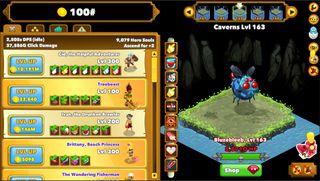Clicker Heroes 2 drops free to play model over developer's ethical concerns
Clicker Heroes made a lot of money, but its studio says it now wants 'a cleaner conscience'.

Clicker Heroes, released in 2015, is a (very) slightly more interactive version of Progress Quest, the faux-RPG that plays itself. You click on enemies, they die, you pick up the gold they drop, and use it to hire more powerful heroes—which is to say, increase the amount of damage you do when you click. It's impossible to die, and if you need to go away for awhile, it will kill monsters all by itself, although at a somewhat slower rate.
It's ridiculous, and oddly popular, and also free to play: For ten bucks, you can purchase one of four packages that adds a new skin and a high-speed auto-clicker, and there's also an in-game currency called "rubies" that can be used to to buy various boosters and upgrades. The sequel, coming next year, won't be taking that route, however. Instead, it will carry a pay-up-front price of $30, with an option for a full refund for a year after it comes out for anyone who preorders.
The problem, developer Playsaurus explained in a blog post, isn't that free-to-play didn't work, but that it worked too well. "In Clicker Heroes 1, we never tried to abuse players with our real-money shop, and for the most part we designed it without the shop in mind so that you never have to purchase rubies to progress. Despite this, we found that some number of players spent many thousands of dollars on rubies. I can only hope that these people could afford it, and that they were doing it to support us, and not to feed an addiction. But I strongly suspect that this is not the case," developer Fragsworth wrote.
"We made a lot of money from these players who spent thousands. They are known to the industry as 'Whales'. Great. If you're rich, please be my guest. But we don't want this kind of money if it came from anyone who regrets their decision, if it made their lives significantly worse as a result."
Improving the underlying design is also a big factor in the decision. "We want the experience to be good," they continued. "The mere existence of real-money purchases puts an ugly cloud over the player's experience, with the persistent nagging feeling of 'My game could be so much better if I just spent a few dollars'. That alone feels terrible."
Having a real-money store also impacts how the game is rebalanced in updates, as people who spent money for a particular kind of experience can end up feeling hosed. "We've experienced this many times in the past," Fragsworth wrote. "As a result, Clicker Heroes 1 is kind of a frankenstein of a game, our hands always having been tied by the fact that we couldn't easily change things that people paid for."
As a premium-priced game, Clicker Heroes 2 can be updated "without too much regard to player process," similar to games like Dwarf Fortress. Players who like the changes can dive in, while those who don't can carry on with the old version, without being unduly penalized. Eliminating microtransactions also opens the door to mods, which is something Playsaurus wasn't able to support in the first game.
The biggest gaming news, reviews and hardware deals
Keep up to date with the most important stories and the best deals, as picked by the PC Gamer team.
Despite the change in direction for Clicker Heroes 2, the original Clicker Heroes will be left as-is. "Most people are OK with how we've handled it. Our unlimited refund policy still stands," Fragsworth wrote. "But going forward we're going to at least try the paid-up-front model for our business. It may or may not work. It probably isn't worth nearly as much money, but at least we can do it with a cleaner conscience."
Andy has been gaming on PCs from the very beginning, starting as a youngster with text adventures and primitive action games on a cassette-based TRS80. From there he graduated to the glory days of Sierra Online adventures and Microprose sims, ran a local BBS, learned how to build PCs, and developed a longstanding love of RPGs, immersive sims, and shooters. He began writing videogame news in 2007 for The Escapist and somehow managed to avoid getting fired until 2014, when he joined the storied ranks of PC Gamer. He covers all aspects of the industry, from new game announcements and patch notes to legal disputes, Twitch beefs, esports, and Henry Cavill. Lots of Henry Cavill.
Most Popular





